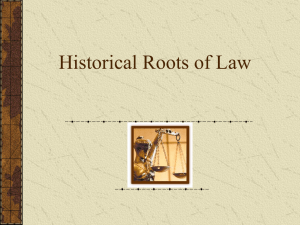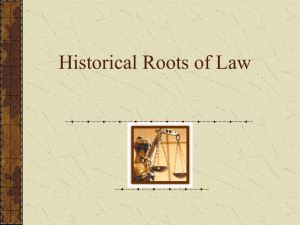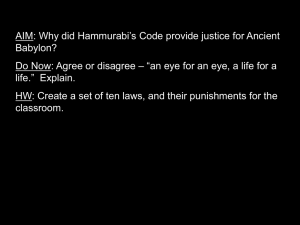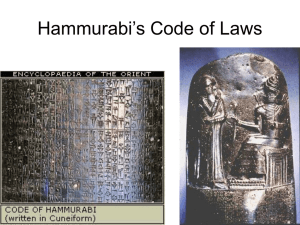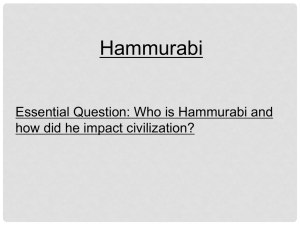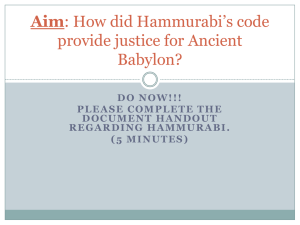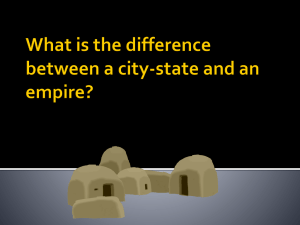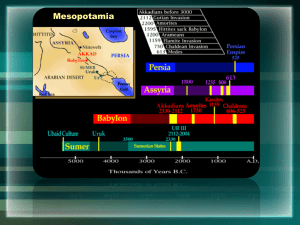File
advertisement
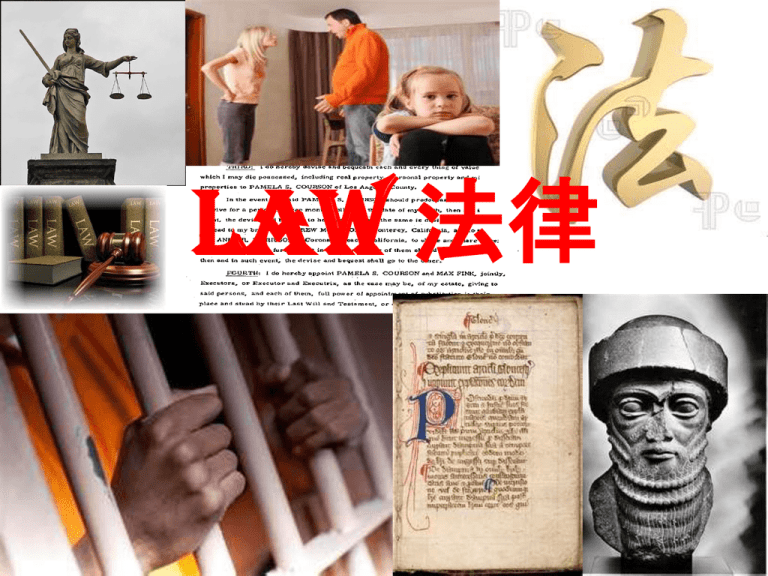
LAW 法律 • INTRODUCTION • What are laws? • They are rules 规则 for a peaceful和平 civilized文明的; 有教养的 society 和平共处. • I think it’s a bond 结 between people to help increase 添加 our freedom 自由. • For example, the law against stealing 盗 increases添加 our freedom自由 to own 拥有 things 东西. • The law against murder 杀害 increases our freedom to live 生活. If someone: • Steals your i-Pod • and all your money… • Murders your whole family… • How would you feel? • What would you do to that person? • ALTERNATIVES 另外的 TO LAW • Anarchy 混乱 is the alternative to law. • Anarchy might sound like fun to teenagers, but when no-one works, and no-one gets an education… • ..millions of people starve to death 饿死 èsǐ. Rape 强奸 and murder 谋杀 become commonplace 平凡. ALTERNATIVES 另外的 TO LAW There is also utopia! 乌托邦Wūtuōbāng;世外桃 空想社会主义 In a perfect world there is no need for laws, right? But, is utopia possible? shìwàitáoyuán! kōngxiǎngshèhuìzhǔyì] • Short HISTORY OF LAW 历史 • Code 法律 of Hammurabi • The Code of Hammurabi 汉穆拉比 is a Babylonian古巴比伦 law code, dating to about 1700 BC. • It is one of the oldest writings in the world. • The 6th Babylonian king, Hammurabi, made the code. The Code has 282 laws, with different punishments刑. How much someone was punished 刑 depended据 on their status等级, 身份, for example a slave奴婢 was punished more than a free自由 person. • Some of Hammurabi’s laws: • 22. If any one is robbing抢走 another person, then he shall be put to death. • 53. If any one be too lazy懒惰 to keep his dam大坝 in working, and the dam break决堤 and all the fields农 作物 be flooded大水, then shall he will be sold卖 for money. • 129: If a man's wife be surprised惊讶 having intercourse 性关系 with another man, both shall be tied系, 结, 绑 and thrown into the water, (drowned灭顶) but the husband丈夫 may forgive原谅 his wife老婆 and the king his slaves. • Adultery通奸tōngjiān • 195. If a son strike打 his father, his hands shall be cut off. 断线, 阻隔, 斩断 WHAT DO YOU THINK ABOUT THIS? • 196: If a nobleman贵族, 君子, 显贵 put out the eye of another nobleman, his eye shall be put out. • What do you think should be the penalty for: • Crimes 罪行zuìxíng • Robbery 抢走 盗 dào? • Murder 杀害 shāhài? • Rape 强奸 qiángjiān? • A son striking 打 his father? • Tax evasion 偷税 tōushuì? • Possible punishments 惩罚 chéngfá • Jail? 监狱 How long? • Execution 处死 chǔsǐ How? Hang 吊死? Shoot? Drowning 溺水,淹死? The history of religion 宗教 [zōngjiào] • …is really the history of law. Amazing! • Each religion created a set of laws that they thought would made a good world. • Mostly they say they say the same thing: • BE GOOD! • Hebrew 希伯来的 Law, The Torah 律法 • According to Jewish犹太 yóutài tradition传说 the Torah was given by God 神 shén to Moses 摩西, in 1312 BC at Mount Sinai • The most important laws are these: Dsf Christian law 基督教的 jīdūjiàode • Christian Law is different from Jewish law. • Jewish law says “an eye for an eye.” Revenge: 复仇 fùchóu • Christian law says “forgive 原谅 yuánliàng people.” • What do you think about revenge? Year 0 to 35 or so… Islamic 伊斯兰教的 Law • Islamic law is based on teachings by Mohammed (570-632) and is similar 相似的 [xiāng sì de] to Jewish law because they believe an “eye for an eye.” But it’s more modern in other ways, because it gives women more rights in some ways. Islam came later in history and includes some Roman law. Buddhism 佛教 • Buddhism is mainly based on the teachings of Gautama Buddha (486 and 483 BCE ) may be the most peaceful religion because they believe they should never kill anything even animals, insects 昆虫, and worms 蚯蚓, so they are vegetarian 素 食者[sùshízhě]. American law The most important American laws are in the Constitution. 宪法 xiànfǎ • American law is complicated 复杂的 fùzá de because there are many kinds of law, including statutory laws 成文法, state laws 州法律, municipal laws 市政法 and laws based on precedence 优先权 from judges 法 官 fǎguān. American courts 法庭 will also consider British Common law 普通法. • SOME MAJOR BRANCHES 分科 OF LAW • • • • • • • • Trade Law 贸易法 and International Trade Law Tax Law 税法 shuì fǎ Family Law 家庭法 jiātíngfǎ Real Estate Law 房地产法 Patent Law 专利法 zhuānlìfǎ Wills 遗嘱 yízhǔ Criminal Law 刑法 xíngfǎ fáng dì chǎn fǎ Vocabulary • • • • • • • • • Law 法律 fǎlǜ Rules 规则 guīzé Anarchy: 混乱 hùnluàn Starve (to death) 饿死 èsǐ Civilized 文明的 wénmíng de Peaceful 和平 hépíng Bond 结 jié Increase 添加 tiānjiā Freedom 自由 zìyóu Steal = rob 盗 dào Own 拥有 yōngyǒu Things 东西 dōngxi Murder 杀害 shāhài Rape 强奸 qiángjiān Live 生活 shēnghuó Code of Hammurabi – ancient 古老的 gǔlǎo de laws from 1700 BC • Babylonian 巴比伦尼亚 bā bǐ lún ní yà • Punishments 刑 xíng • • • • • • • Depending on 依 yī Status 等级 děngjí Slave 奴隶 núlì Lazy 懒惰 lǎnduò Surprise 惊讶 jīngyà (very surprised is: astonished) • Intercourse: 性关系 xìngguānxì • Adultery 通奸) tōngjiān • Forgive 原谅 yuánliàng • • • • • • • • • • • • • • • • • Strike 打 dǎ Crimes 罪行 zuìxíng Punishments 惩罚 chéngfá Jewish 犹太 Yóutài de God 神 shén Christian 基督教 jīdūjiào Islam 伊斯兰教 Buddhism 佛教 Respect 尊敬 zūnjìng Magna Carta 大宪章 dà xiànzhāng Court 法庭 fǎtíng Judge 法官 fǎguān • • • • • • • • • Complicated 复杂的 fùzá de Branches 分科 fēnkē Trade Law 贸易法 mào yì fǎ Tax Law 税法 shuì fǎ Family Law 家庭法 jiā tíng fǎ Real Estate Law 房地产法 fáng dì chǎn fǎ Patent Law 专利法 zhuānlìfǎ Wills 遗嘱 yízhǔ Criminal Law 刑法 xíngfǎ
